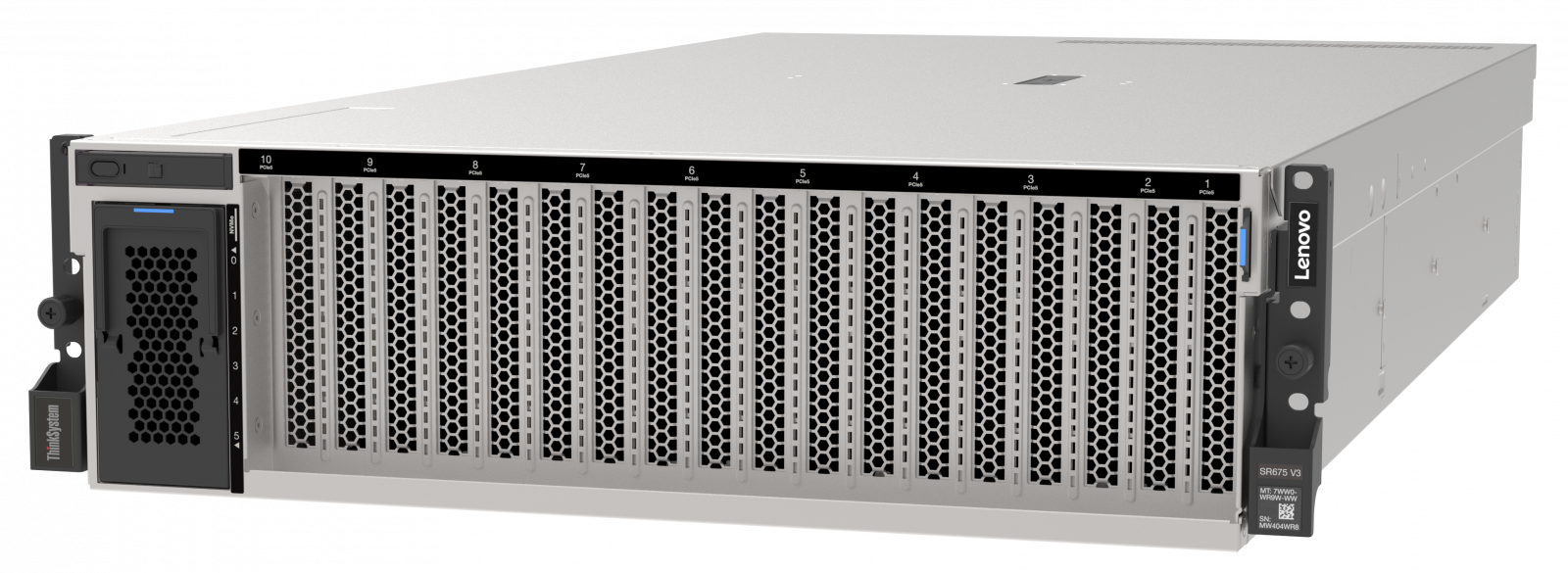Author
Published
10 Oct 2024Form Number
LP2038PDF size
4 pages, 1.1 MBAbstract
This article introduces the new 5th Gen AMD EPYC processors and their availability in Lenovo ThinkSystem servers.
Introduction
Lenovo is pleased to announce the support of the newest addition to the AMD EPYC family, the 5th Gen AMD EPYC 9005 series processors, formerly codenamed “Turin”. These processors are supported on the ThinkSystem V3 servers that currently support the 4th Gen "Genoa" processors.

Figure 1. Lenovo ThinkSystem SR665 V3, now with support for 5th Gen AMD EPYC processors
5th Gen AMD EPYC
5th Gen AMD EPYC processors are built on the new Zen 5 cores, scaling all the way from 8 cores/16 threads up to 192 cores/384 threads. Performance-per-watt is a key feature of these new processors, which is especially useful to customers who are already running at full power capacity in their data centers, needing to find ways to implement AI solutions.
Security is another key focus area - becoming even more important in the AI era as data is moved outside the boundary of the CPU across PCIe lanes to GPUs and other devices. With the new Trust IO feature, expanding the trust domain to include these other devices is an essential step to further reduce attack surfaces and keep data safe.
These powerful Zen 5 cores extend performance leadership and enable AVX512 with a full 512-bit data path. 5th Gen AMD EPYC 9005 includes processors with peak frequencies of 5GHz, ideal for compute bound workloads in HPC, core-based licensed applications. They are an excellent companion processor for high-performance GPUs, enabling customers to maximum their GPU-accelerated infrastructure investments.
Processors in the EPYC 9005 series are divided into two groups, those with the Zen 5 design, and those with the Zen 5c design.
- Zen 5 processors are ideal for workloads needing the best possible per-core performance. This includes legacy applications that use fewer threads for their processing, or applications that have license limitations.
- Zen 5c processors have an increased core density, and offer the best power efficiency. They are best for containerized workloads a maximum scale.
ThinkSystem V3 server support
The following servers support the new 5th Gen AMD EPYC processors. Click the links to see the updated data sheets, product guides, and 3D Tours.
- 1U rack servers:
- 2U rack servers:
- GPU-rich 3U rack server:
- Multi-node server:
- Supercomputing servers:

Figure 2. ThinkSystem SR675 V3 supporting 2x AMD EPYC processors and 8x double-wide PCIe GPUs
Processors specifications
Compare the specifications of all AMD EPYC processors in the following page:
For more information
For more information on the new offerings, see the following resources:
- Lenovo launch page: Unmatched Performance: AMD Thrives on Lenovo ThinkSystem
- AMD launch page: Advance Data Center AI with Servers Powered by AMD EPYC Processors
Trademarks
Lenovo and the Lenovo logo are trademarks or registered trademarks of Lenovo in the United States, other countries, or both. A current list of Lenovo trademarks is available on the Web at https://www.lenovo.com/us/en/legal/copytrade/.
The following terms are trademarks of Lenovo in the United States, other countries, or both:
Lenovo®
Neptune®
ThinkSystem®
The following terms are trademarks of other companies:
AMD and AMD EPYC™ are trademarks of Advanced Micro Devices, Inc.
Other company, product, or service names may be trademarks or service marks of others.
Configure and Buy
Full Change History
Course Detail
Employees Only Content
The content in this document with a is only visible to employees who are logged in. Logon using your Lenovo ITcode and password via Lenovo single-signon (SSO).
The author of the document has determined that this content is classified as Lenovo Internal and should not be normally be made available to people who are not employees or contractors. This includes partners, customers, and competitors. The reasons may vary and you should reach out to the authors of the document for clarification, if needed. Be cautious about sharing this content with others as it may contain sensitive information.
Any visitor to the Lenovo Press web site who is not logged on will not be able to see this employee-only content. This content is excluded from search engine indexes and will not appear in any search results.
For all users, including logged-in employees, this employee-only content does not appear in the PDF version of this document.
This functionality is cookie based. The web site will normally remember your login state between browser sessions, however, if you clear cookies at the end of a session or work in an Incognito/Private browser window, then you will need to log in each time.
If you have any questions about this feature of the Lenovo Press web, please email David Watts at dwatts@lenovo.com.
